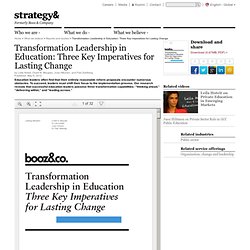

The Nature and Effects of Transformational School Leadership. Transformational Leadership: How These Leaders Inspire and Motivate. Have you ever been in a group where someone took control of the situation by conveying a clear vision of the group's goals, a marked passion for the work, and an ability to make the rest of the group feel recharged and energized?

This person just might be what is called a transformational leader. Transformational leadership is a type of leadership style that can inspire positive changes in those who follow. Transformational leaders are generally energetic, enthusiastic, and passionate. Not only are these leaders concerned and involved in the process; they are also focused on helping every member of the group succeed as well. Transformation Leadership in Education: Three Key Imperatives for Lasting Change. Transformation Leadership in Education: Three Key Imperatives for Lasting Change by Leila Hoteit, Chadi N.

Moujaes, Jussi Hiltunen, and Pasi Sahlberg Published: May 9, 2012 Education leaders often find that their entirely reasonable reform proposals encounter numerous obstacles. To succeed, leaders must shift their focus to the implementation process. Our research reveals that successful education leaders possess three transformation capabilities: “thinking ahead,” “delivering within,” and “leading across.” Loading... Chadi N. Leading Research Transformation Leadership in Education Three Key Imperatives for Lasting Change Contact Information Abu DhabiChadi N. Dr. Jussi Hiltunen Senior Associate +97126992400 jussi.hiltunen@booz.com Helsinki Dr. Jon R.
Booz & Company Our research with successful transfor-mation leaders around the world iden-tified three roles that these individuals fulfill. Education is the engine of national growth. Show transcript. Scholarworks.montana.edu/xmlui/bitstream/handle/1/1933/NashS0512.pdf?sequence=1. Www.acer.edu.au/documents/RC2007_Hallinger-RetrospectAndProspect. Www.iojes.net/userfiles/Article/IOJES_949.pdf. Www.ascd.org/ASCD/pdf/journals/ed_lead/el_199202_leithwood.pdf.
Individual consideration viewed at multiple levels of analysis: A multi-level framework for examining the diffusion of transformational leadership. Transformational Leadership: How Principals Can Help Reform School Cultures - School Effectiveness and School Improvement - Volume 1, Issue 4. Collaborative school cultures have been associated with the achievement of a number of school reform objectives for both teachers and students.

Little is known, however, about how such cultures develop and whether or how school administrators can facilitate that process. This study examined the practices of administrators in each of 12 schools which had developed highly collaborative professional relationships over a three year period in the context of school improvement initiatives. Results suggest the feasibility of developing more collaborative school cultures in a relatively brief period of time and clarify the role played by the larger context of school improvement for fostering collaboration. Specific strategies used by the administrators are described. These strategies are associated with a concept of leadership termed “transformational”. Related articles View all related articles. Leading Educational Change: reflections on the practice of instructional and transformational leadership - Cambridge Journal of Education - Volume 33, Issue 3.
The effects of transformational leadership on organizational conditions and student engagement with school. Transformational leadership in schools – Panacea, placebo or problem? Classical models of managerial leadership: trait, behavioural, contingency and transformational theory. Contents: introduction · trait approaches to leadership · behavioural approaches to leadership · situational or contingency approaches to leadership · transformational approaches to leadership · authority · charisma · in conclusion · further reading and references · links · how to cite this piece I think there are particular people that others will follow, for whatever reason.

Perhaps they have a sense of humour, they like their style. When you look at organising events it’s somebody who’s got what is termed as ‘leadership qualities’, they are people who are willing to tell other people what to do but have the respect of other people as well, or gain that respect. Many of the images associated with leadership have their roots in conflict. It is the stuff of generals who outwit their opponents, politicians who convince and channel groups into action, and people who take control of a crisis. But what is leadership? Traits Behaviours Concern for task. Situations Transformations. Www.uk.sagepub.com/upm-data/58107_Siraj_Blatchford_&_Hallet. Transformational Leadership. School leaders engage in transformative leadership, in which they intentionally become critically aware of their own tacit assumptions and expectations and assess their significance and consequence in decision making.

Transformative leaders engage in reflective processes that enable self-evaluation of personal values, beliefs, and experiences, and they intentionally promote the conditions and experiences for transformation in their staff. This includes nurturing the voices of others and building their capacity to take leadership in the school community. Leaders have developed the ability to interrupt inequitable practice, to use inquiry as a lens for equity , to show courage and persistence, to develop social and emotional intelligences among staff and students, to learn from diverse forms of knowledge and experience, and to examine individual and institutional culture as it relates to equity and anti-bias.
Www.sagepub.com/northouse6e/study/materials/reference/reference4.1.